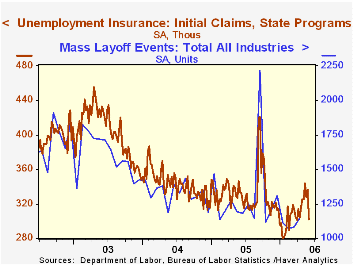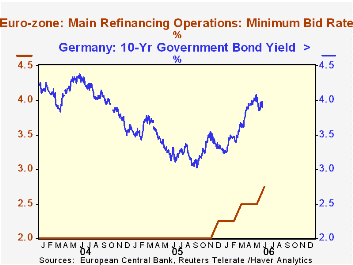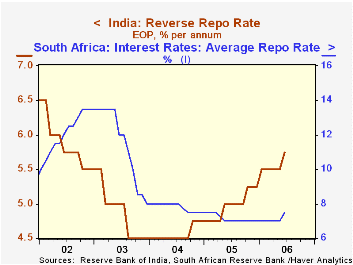 Global| Jun 08 2006
Global| Jun 08 2006Initial Jobless Insurance Claims Fell To Two Month Low
by:Tom Moeller
|in:Economy in Brief
Summary
Initial claims for unemployment insurance fell 35,000 w/w to the lowest level since early April. The decline last week to 302,000 followed a slightly revised 9,000 increase the prior period and may have been biased down by the [...]

Initial claims for unemployment insurance fell 35,000 w/w to the lowest level since early April. The decline last week to 302,000 followed a slightly revised 9,000 increase the prior period and may have been biased down by the Memorial Day holiday. Consensus expectations had been for 330,000 claims.
The four week moving average of initial claims fell to 327,750 (-1.9% y/y).
Continuing claims for unemployment insurance reversed the downwardly revised increase the prior week and fell 5,000.
The insured rate of unemployment was stable at 1.9% for the third consecutive week.
Adjusting to the Next Stage of the Housing Cycle is yesterday's speech given by Jack Guynn, President of the Federal Reserve Bank of Atlanta, and it is available here.
| Unemployment Insurance (000s) | 06/03/06 | 05/27/06 | Y/Y | 2005 | 2004 | 2003 |
|---|---|---|---|---|---|---|
| Initial Claims | 302 | 337 | -9.6% | 332 | 343 | 403 |
| Continuing Claims | -- | 2,415 | -7.2% | 2,663 | 2,923 | 3,530 |
by Carol Stone June 8, 2006

It was expected that the ECB would raise its refinancing rate at today's scheduled meeting, and indeed the Governing Council lifted it to 2.75% from 2.50%. However, what was not at all expected were similar kinds of moves by central banks around the world. South Koreans moved their overnight call rate target from 4.00% to 4.25%, the Reserve Bank of South Africa raised their repo rate by half-a-percent to 7.50%, and the Reserve Bank of India pushed its reverse repo rate to 5.75% from 5.50%. Some countries have been raising rates for some time, but for South Africa, this was the first increase since 2002. Turkey, which has made such decisive progress getting its rates down, was actually the first to move, on Wednesday, when it raised its rate from 13.25% to 15.00%.
Inflation, which had behaved in such an encouraging way for a long time, has now started to pick up, as we discussed here yesterday with Austria's wholesale prices. Tom Moeller also covered the phenomenon yesterday in showing the "TIP spread" and the University of Michigan's consumer sentiment survey. In the latter measure for May, consumers anticipate inflation over the next year of 4.7%, up from 3.8% in January. At the same time, economies that had been weak, have gained strength, especially across Europe and in Japan. Last week, India reported a 9.3% rate of growth for Q1.
So central banks are trying to keep "ahead of the curve" on these issues, and the simultaneous action by so many on a single day is impressive. Indeed, bond markets reacted positively; German 10-year government bond yields, for instance, dropped in yield from 3.98% to 3.90%, a substantial one-day move. Such an endorsement should be gratifying to inflation-fighting central bankers.
| June 8 | May | Dec 2005 | Dec 2004 | Dec 2003 | Dec 2002 | |
|---|---|---|---|---|---|---|
| ECB | 2.75 | 2.50 | 2.25 | 2.00 | 2.00 | 2.75 |
| South Korea | 4.25 | 4.00 | 3.75 | 3.25 | 3.75 | 4.25 |
| India | 5.75 | 5.50 | 5.25 | 4.75 | 4.50 | 5.50 |
| Turkey | 15.00 | 13.25 | 13.5 | 18.00 | 26.00 | 44.00 |
| South Africa | 7.50 | 7.00 | 7.00 | 7.50 | 8.00 | 13.50 |
| Thailand | 6.50 | 6.25 | 5.50 | 3.50 | 2.75 | 3.25 |
Tom Moeller
AuthorMore in Author Profile »Prior to joining Haver Analytics in 2000, Mr. Moeller worked as the Economist at Chancellor Capital Management from 1985 to 1999. There, he developed comprehensive economic forecasts and interpreted economic data for equity and fixed income portfolio managers. Also at Chancellor, Mr. Moeller worked as an equity analyst and was responsible for researching and rating companies in the economically sensitive automobile and housing industries for investment in Chancellor’s equity portfolio. Prior to joining Chancellor, Mr. Moeller was an Economist at Citibank from 1979 to 1984. He also analyzed pricing behavior in the metals industry for the Council on Wage and Price Stability in Washington, D.C. In 1999, Mr. Moeller received the award for most accurate forecast from the Forecasters' Club of New York. From 1990 to 1992 he was President of the New York Association for Business Economists. Mr. Moeller earned an M.B.A. in Finance from Fordham University, where he graduated in 1987. He holds a Bachelor of Arts in Economics from George Washington University.
More Economy in Brief
 Global| Feb 05 2026
Global| Feb 05 2026Charts of the Week: Balanced Policy, Resilient Data and AI Narratives
by:Andrew Cates






